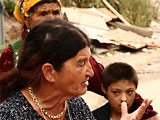Europe’s Unwanted
By Shana Goldberg for ISN
The lifestyle of the Roma, some of Europe’s oldest scapegoats, has long elicited strong and very diverse reactions: there are those who battle indefatigably for equal rights for Roma and an end to marginalization; those who romanticize their nomadic life; and those who accuse the entire race of everything from laziness to child slavery.
Debate over the Roma was generally kept at a local level, with individual countries pursuing their own minority policies – at least until 2004, when the EU embarked on its eastern expansion project and in 2007 with the accession of Bulgaria and Romania. Today, the Roma constitute Europe’s largest ethnic minority and the issue of their status in society has moved beyond the realm NGOs and into politics.
That the Roma would play a vital role in the EU’s acceptance of new member states was evident early on. The EU’s external pageCopenhagen Criteriacall_made for Central and Eastern Europe demands that members “respect human rights, the rule of law and the protection of minorities.”
But while acceptance of these terms provides the Roma with a “mild political advantage,” the effects of accession are short term, Rob Kushen, managing director of the external pageEuropean Roma Rights Centercall_made, tells ISN Security Watch. After joining the EU, countries “return to their old ways,” he says, citing the Czech Republic’s lack of anti-discrimination legislation.
In 2008, the EU’s Agency for Fundamental Rights (FRA) conducted its first EU MIDIS external pagesurveycall_made, finding that half of Roma respondents reported experiencing multiple episodes of discrimination in a 12-month period.
In fact, the Roma could be viewed as the ideal pan-European citizens, retaining little nationalist sentiment and settled throughout the continent. Despite this, a supranational Europe has not welcomed the Roma. In many cases, most infamously in the case of emigration to Italy, when Roma use their EU-given freedom of movement, they are met with hostility and even violence.
And they aren’t faring any better at home. In recent months, with the economic crisis deepening in former communist countries, violence against Roma is on the rise. The most extreme series of attacks is taking place in Hungary, where in the last year seven Roma have been murdered.
Alongside the spate of killings is the rise of Hungary’s right-wing political party, Movement for a Better Hungary, commonly known by its acronym Jobbik, and what is believed to be its paramilitary arm, the nationalist Magyar Garda, or Hungarian Guard. In a country where the IMF is forecasting -3.3 percent growth for 2009, finding a scapegoat is de rigueur.
The Roma are easy targets. Unemployment is high, poverty persists and welfare dependency widespread. The Roma culture of self-exclusion not only reinforces the perception of their status as outsiders, but also means that many lead a life with little or no documentation, contributing to a lack of property and business ownership and inability to register for school. These realities reflect a dismal quality of life and perpetuate stereotypes and prejudice.
Improving the situation of the Roma is twofold: combating racism while promoting social and economic development – both of which have been bolstered by EU enlargement.
An Open Society, World Bank and EU-sponsored conference held ahead of 2004’s enlargement, “Roma in an Expanding Europe,” led to the creation of the external pageDecade of Roma Inclusioncall_made, a unique 12-country initiative engaging international bodies, multilateral organizations and NGOs with the aim of improving social, education and employment conditions for the Roma.
In November 2008, the EU approved a framework decision on racism, which aims to make incitement to racial hatred a criminal offense.
At the very least, even if life on the ground hasn’t improved dramatically, for Roma living in EU member states, it is now possible to appeal to a higher body when national governments either ignore or foment discrimination.
And for those who ask whether the Roma couldn’t take more responsibility for their own progress, Kushen says that ultimately, “a human rights violation is a human rights violation.” The responsibility of the EU and its member states is to ensure that rights enshrined in EU law are upheld – even for the Roma.

